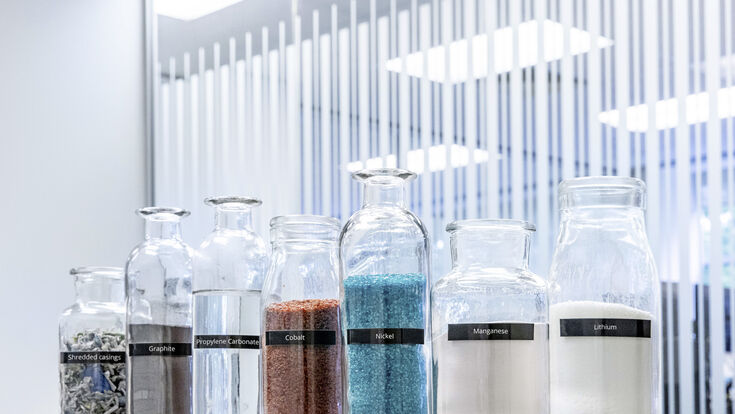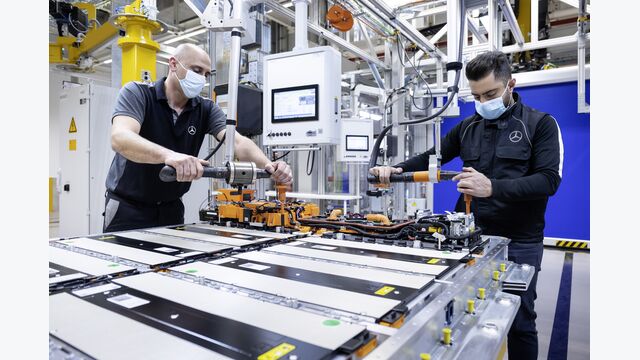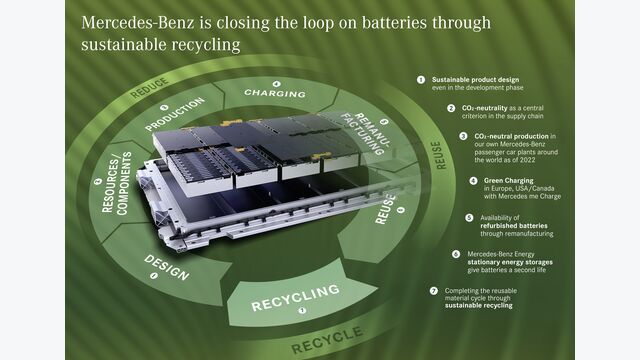Battery Recycling : Mercedes-Benz starts own battery recycling plant in 2023

Mercedes-Benz AG has firmly established the principle of sustainability as an integral part of its corporate strategy. In addition to CO2-neutral production and the switch to an all-electric vehicle portfolio, a closed loop of recyclable materials is also crucial to reducing resource consumption. In addition to circular design and value retention, Mercedes-Benz is equally focused on recycling. With a view to the future return of lithium-ion battery systems from Mercedes-EQ vehicles, the company is therefore now expanding its global battery recycling strategy. Mercedes-Benz is starting to build its own battery recycling plant in Germany, based on hydrometallurgy. Analogous to this technology, the company plans to close the recyclable material loop with high-tech partners for battery recycling in China and the USA.
Mercedes-Benz recycling plant in Kuppenheim, southern Germany
An important milestone in the global Mercedes-Benz battery recycling strategy is the establishment of an own pilot plant for the recycling of lithium-ion battery systems. To this end, Mercedes-Benz has founded LICULAR GmbH as a wholly owned subsidiary. For the conceptual design and construction of the facilities, LICULAR GmbH plans to cooperate with the technology partner Primobius, which as a joint venture of the German mechanical engineering company SMS group and the Australian project developer Neometals is contributing the necessary technological know-how, including the relevant preliminary investigations, to the project. The companies have signed a memorandum of understanding. Scientific support for the project is to be provided by the renowned research institutes of the Karlsruhe Institute of Technology and the Technical Universities of Clausthal and Berlin.
The project is intended to set standards in terms of battery recycling from an ecological point of view: the process design of the patented hydrometallurgy with recovery rates of more than 96 percent is expected to allow a holistic circular economy of battery materials. Mercedes-Benz is investing a double-digit million euro amount in research and development, as well as in the construction of the CO2-neutral pilot plant at the Mercedes-Benz location in Kuppenheim in southern Germany. The project has received the prospect of funding under the Battery Innovation Support Program of the German Federal Ministry of Economics and Climate Protection.
In the future, the new pilot plant will map the entire process chain of battery recycling: from the development of logistics concepts and the sustainable recycling of valuable raw materials to the reintegration of recyclate into the production of new batteries. The new recycling plant is based on an innovative mechanical/hydrometallurgical process, which completely dispenses with energy-intensive and material-consuming pyrometallurgical process steps. The direct integration of hydrometallurgy into the overall concept of a recycling plant is a first in Europe, and acts as a key element in the realization of sustainable battery recycling in the sense of a true circular economy.
Construction of the plant is in two stages. Initially, a plant for mechanical dismantling will be constructed by 2023. As a second step - subject to promising discussions with the public sector - the facilities for hydrometallurgical processing of the battery materials are to go into operation. This means that in the future, Kuppenheim could cover all the stages from dismantling to module level, shredding and drying and subsequent processing of battery-grade material flows.
The pilot plant is expected to have an annual capacity of 2,500 tonnes. The recovered materials will be fed back into the recycling loop to produce more than 50,000 battery modules for new Mercedes-EQ models. Based on the findings of the pilot plant, production volumes could be scaled up in the medium to long term.
Mercedes-Benz is starting to build its own battery recycling plant in Germany. The process design of the patented hydrometallurgy with recovery rates of more than 96 percent is expected to allow a holisticcircular economy of battery materials. The recovered materials will be fed back into the recycling loop.
- © Daimler AG

